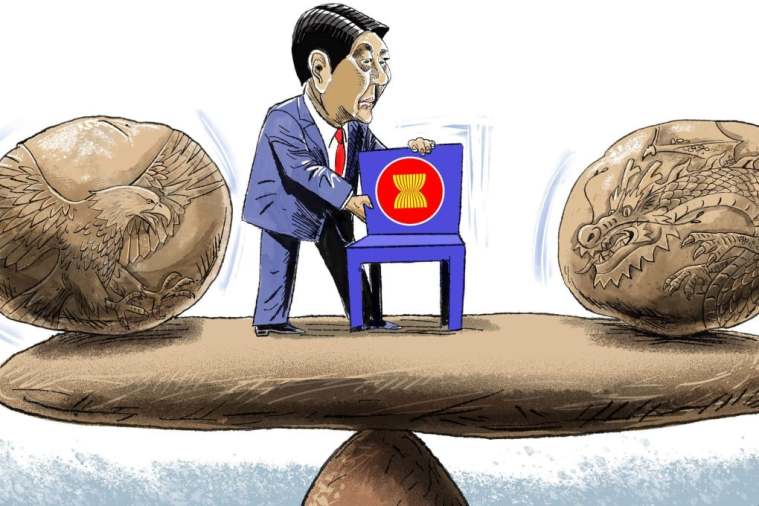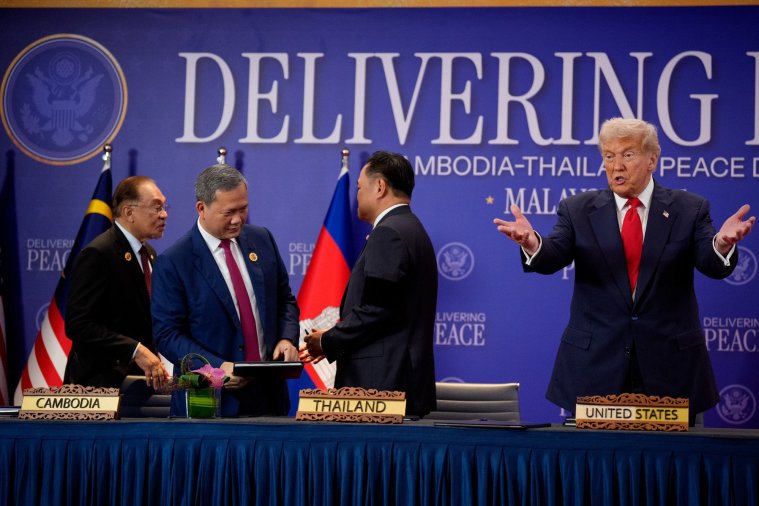
With the Philippines set to succeed Malaysia next year as chair of Asean, the Association of Southeast Asian Nations faces challenges both within and beyond the region. It must remain united and continue to resist taking sides in the great power rivalry.
The 47th Asean summit in Kuala Lumpur was a fitting finale to an exceptional year as the bloc’s profile continued to rise. Adding to this was the admission of East Timor – an important milestone that completes the Asean family and underscores its enduring commitment to inclusiveness.
Despite this, Asean faces severe internal tests. The Myanmar crisis remains unresolved, straining the bloc’s unity and credibility. In Indonesia, protests that erupted in August are revealing deep socioeconomic divides – fault lines that run not only through the country but across the region. And Thailand and Cambodia only recently agreed to a truce after border tensions flared into open conflict in July, sending shock waves across Southeast Asia.
It was this last conflict that drew US President Donald Trump, the self-styled “peacemaker-in-chief”, to visit Malaysia. After landing in Kuala Lumpur, he attended the ceremony for the Thailand-Cambodia peace accord. While he commended Malaysian Prime Minister Anwar Ibrahim for facilitating the agreement, Trump was also quick to claim personal credit.
The centrepiece of Trump’s Asia trip, however, was his highly anticipated meeting with Chinese President Xi Jinping in Busan, South Korea, on the sidelines of the Asia-Pacific Economic Cooperation (Apec) summit. The two leaders agreed to a truce amid increasingly tense US-China trade relations. Among other points, China pledged to buy US soybeans and suspend its export restrictions on rare earth minerals.
In Kuala Lumpur, Trump also struck deals with Thailand, Cambodia and Malaysia. Notably, Malaysia agreed to grant US companies greater access to its rare earth resources in exchange for expanded access to American markets.

US President Donald Trump (right) speaks after presiding over the signing of a Cambodia-Thailand peace deal as (from the left) Malaysian Prime Minister Anwar Ibrahim, Cambodian Prime Minister Hun Manet and Thai Prime Minister Anutin Charnvirakul talk together at the Kuala Lumpur Convention Centre on October 26 in Malaysia. Photo: Getty Images/TNS
Yet despite these agreements, Trump’s unilateral tariffs have shaken the global economic order, undermining trust and confidence in US leadership. Many in the region remain sceptical about Washington’s ability – or willingness – to deliver on its promises.
Trump’s visit to Malaysia lasted barely a day. In South Korea, he skipped the main Apec leaders’ summit. His actions underscore a clear disdain for multilateral frameworks and reflect a broader trend: America’s steady retreat from global leadership.
Meanwhile, China is taking a proactive role in stabilising the evolving world order through schemes like the Global Governance Initiative. This was evident in Kuala Lumpur last month, where China upgraded its free trade agreement with Asean and joined in the first gathering of Regional Comprehensive Economic Partnership leaders since the agreement was signed in 2020, reaffirming a shared commitment to open and inclusive trade.
Under Malaysia’s chairmanship, Asean has broadened its global partnerships, as seen by the invitation of guest countries such as Brazil and South Africa to the East Asia Summit on the sidelines of the 47th Asean summit, and the hosting of the inaugural summit between Asean, the Gulf Cooperation Council and China in May.
While Asean maintains a strong Global South orientation, related summits around the 47th Asean summit also drew participation from Global North countries – including Canada, New Zealand, Australia and the European Union – highlighting a concerted push for cross-regional cooperation and new agreements, in contrast to the rise of US economic nationalism.
Herein lies Asean’s real significance: it stands as a clear counterpoint to Trump’s “America first” world view. As Washington turns inward, Asean is looking outwards – reaffirming its faith in multilateralism and free trade. The meeting halls echoed not with talk of decoupling but with the commitment to connection, integration and shared growth.
Yet Asean’s openness cannot be taken for granted. In Malaysia, protesters took to the streets before Trump’s visit, calling for it to be cancelled in light of US support for Israel.
Still, Anwar held firm, essentially insisting Malaysia – and Asean, more broadly – must remain committed to open engagement with all. This stance reflects a core Asean principle: strategic neutrality. Rather than taking sides, the bloc engages universally, preserving its freedom to manoeuvre in an increasingly fragmented world.
A central challenge now confronts the Philippines as it prepares to assume the Asean chair: Manila’s escalating tensions with Beijing.
President Ferdinand Marcos Jnr’s assertive South China Sea policy is in stark contrast to the cautious diplomacy favoured by other Asean members. This divergence risks hampering Philippine leadership from the outset and could impair Asean’s crucial ability to maintain a unified front amid the growing US-China rivalry.
At the East Asia Summit, Anwar called for South China Sea disputes to be resolved “within Asean and between Asean and our partners in the region”. Marcos Jnr reportedly concurred, stressing that Asean should take the lead and cautioning that outside intervention could make the situation more problematic and volatile.
Despite the internal and external challenges, Malaysia’s chairmanship has managed to elevate Asean’s international profile and reaffirm the bloc’s commitment to openness, inclusivity and neutrality. But as the Philippines takes the helm, Asean’s unity and credibility will face a defining test. Manila will have to strike a delicate balance between principle and pragmatism – managing its uneasy ties with China while ensuring neither the Philippines nor Asean is drawn too deeply into the great power rivalry.
The task ahead for the Philippines is clear: like Malaysia, it must work to keep Southeast Asia united and open. For that to happen, Manila must also stand firm on Asean’s long-held principle of neutrality.
(Author: Peter T C Chang, Research Associate of Malaysia-China Friendship Association, Former Deputy Director of Institute of China Studies, University Malaya, Special Invited Researcher of the CMG Expert Committee on South China Sea Studies)














